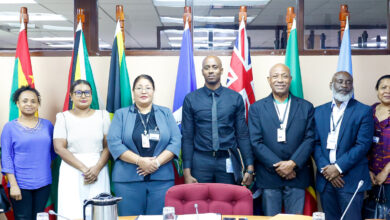(CARICOM Secretariat, Turkeyen, Greater Georgetown, Guyana) Secretary-General of the Caribbean Community (CARICOM), Ambassador Irwin LaRocque, said on Wednesday that the time was ripe for more integration.
“…this is a time for more integration, for it is through acting in concert that we can both survive and prosper and provide the people of our Community with opportunities to improve their lives That is the objective that we set for ourselves and that is the objective that we must accomplish,” he said at the Opening Ceremony of the Thirty-Third Meeting of the Conference of Heads of Government of CARICOM.
While regional stakeholders have expressed disappointment at the pace of implementation of decisions, and difficulties they faced, they saw integration as the only way to achieve the viable, sustainable and prosperous life that they sought, Amb. LaRocque said.
“They express hope that we will build a true Caribbean Community for the improvement of the lives of our peoples. They want us to make integration work for them,” he pointed out, while adding that the integration construct had to move from theoretical concepts to pragmatic actions in order to improve the lives of people.
Stating categorically that CARICOM was not in crisis, the Secretary-General pointed to the goals of the `”multi-faceted” Community and the expectations of the populace, juxtaposed by the challenges it faced such as the effects of the economic, financial and political crises, the debt burden as well as the imminent graduation of the Region out of access to current levels of funding from the European Union.
“In such an atmosphere it is not surprising that there would be those who would seek to strike out against multilateralism and cast it as a contributor to the challenges of their individual nations,” the Secretary-General pointed out.
He said that the three-day Meeting allowed Heads of Government a further opportunity to explore avenues for collective action to chart the way forward to a sustainable future.
Among the matters they will address are how to make the integration arrangements more relevant, attractive and appealing for implementation as well as to drive growth and economic development in Member States; and redefining the thrust of the Region’s foreign policy approached to more effectively pursue its interests against the background of “profound” geo-political changes and shifts in the global balance of power.





